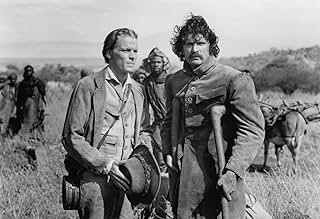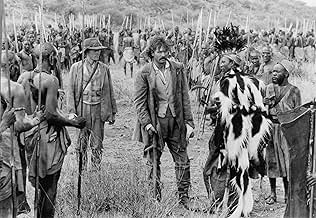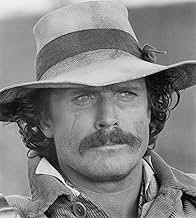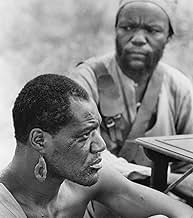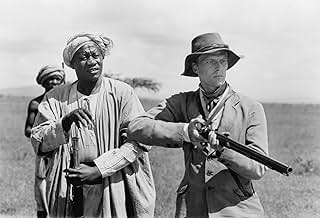VALUTAZIONE IMDb
7,1/10
4560
LA TUA VALUTAZIONE
La leggendaria storia vera del capitano Richard Francis Burton e della tumultuosa spedizione del tenente John Hanning Speke alla ricerca della sorgente del fiume Nilo.La leggendaria storia vera del capitano Richard Francis Burton e della tumultuosa spedizione del tenente John Hanning Speke alla ricerca della sorgente del fiume Nilo.La leggendaria storia vera del capitano Richard Francis Burton e della tumultuosa spedizione del tenente John Hanning Speke alla ricerca della sorgente del fiume Nilo.
- Regia
- Sceneggiatura
- Star
- Premi
- 1 vittoria in totale
Recensioni in evidenza
"Mountains of the Moon" is the kind of epic that seems to need a director like Bob Rafelson. I hoped this would be his "Lawrence of Arabia," but something goes amiss in the construction of the drama which Rafelson coauthored. For instance, we learn more about the two protagonists in two single lines than the 40 minutes that begin the film: Speke: (asking permission to organize some specific details of setting up an expedition in to the interior of Africa) responds, "I already have"; and for Burton: (a voice over) "Dear Isabelle
." The meandering, surprisingly cruel, first 40 minutes of the film become irrelevant.
Speke and Burton's search to find the source of the Nile is great material for a film. The scenery alone would lead any director to jump at the chance, but as so often occurs with films about Africa, the Continent overpowers the human drama. Rafelson is a master of human intimacy, and this story of two men's friendship which turns to rivalry is badly mangled by the screenplay. Burton's life alone is a huge trove for the subject of a film, and Rafelson seems to never grip the nature of these men, the essence of the story nor how to tell it.
Yet, the film is worth spending time with only to lavish in the effort of these two men and perhaps the last time when "discovery" meant a places on a map.
Speke and Burton's search to find the source of the Nile is great material for a film. The scenery alone would lead any director to jump at the chance, but as so often occurs with films about Africa, the Continent overpowers the human drama. Rafelson is a master of human intimacy, and this story of two men's friendship which turns to rivalry is badly mangled by the screenplay. Burton's life alone is a huge trove for the subject of a film, and Rafelson seems to never grip the nature of these men, the essence of the story nor how to tell it.
Yet, the film is worth spending time with only to lavish in the effort of these two men and perhaps the last time when "discovery" meant a places on a map.
This is an excellent film, and it's unfortunate that it wasn't more widely seen. I wish I would've caught it in the theater, as I'm sure it would be magnificent there.
In it, you're going to see some of the most painfully memorable scenes in cinema (that I refuse to give away), and an epic story that is most remarkably, wholly true.
I loved Raiders of the Lost Ark, and before "meeting" Sir Richard Francis Burton, thought characters of Indy's ilk were simply figments of Steven Spielberg's imagination. However, with study you will find that Burton's experience (and that well beyond this expedition) makes him one of the most enigmatic, interesting people to have ever walked the face of the earth. As they say, truth is stranger than fiction.
Slow, smart, challenging, beautiful. And highly recommended viewing.
In it, you're going to see some of the most painfully memorable scenes in cinema (that I refuse to give away), and an epic story that is most remarkably, wholly true.
I loved Raiders of the Lost Ark, and before "meeting" Sir Richard Francis Burton, thought characters of Indy's ilk were simply figments of Steven Spielberg's imagination. However, with study you will find that Burton's experience (and that well beyond this expedition) makes him one of the most enigmatic, interesting people to have ever walked the face of the earth. As they say, truth is stranger than fiction.
Slow, smart, challenging, beautiful. And highly recommended viewing.
The British Empire owed a lot to opportunistic soldiers of fortune as well as to explorers: men who risked their lives (and the lives of others) for profit, fame and the recognition from their peers for their accomplishments. In the last category one could think of men like Livingstone, Stanley, Scott and Burton. Captain Richard Francis Burton (whose life we follow in this film) risked a lot for the sake of discovery (to find the source of the Nile) but at the same time he was also a man with a genuine interest and outmost respect for the indigenous peoples and cultures found deep in Africa.
In the film we see Burton joining forces with a young and ambitious Lieutenant (Lt. Speke) to travel again to his beloved Africa to locate the source of Nile with an expedition funded by the Royal Geographical Society. The film is an account of this trip but shows also events before and after this. Watching this movie we can grasp the differences between the two men, their strong ties and friendship during their common effort in the expedition and also later how each one coped with their success at home (London).
The Mountains of the Moon is a fascinating film. It tells a great story without romanticizing the situations during and after the trip to Africa. Burton, Speke and their comrades endured too much to find the source of Nile, and all of them for their own reasons. The novel by William Harrison (that this movie is based on) does not fall into the trap of trying to imitate Conrad's 'Heart of Darkness' but gives us a different perspective altogether. Do not miss this film.
In the film we see Burton joining forces with a young and ambitious Lieutenant (Lt. Speke) to travel again to his beloved Africa to locate the source of Nile with an expedition funded by the Royal Geographical Society. The film is an account of this trip but shows also events before and after this. Watching this movie we can grasp the differences between the two men, their strong ties and friendship during their common effort in the expedition and also later how each one coped with their success at home (London).
The Mountains of the Moon is a fascinating film. It tells a great story without romanticizing the situations during and after the trip to Africa. Burton, Speke and their comrades endured too much to find the source of Nile, and all of them for their own reasons. The novel by William Harrison (that this movie is based on) does not fall into the trap of trying to imitate Conrad's 'Heart of Darkness' but gives us a different perspective altogether. Do not miss this film.
It's 1854. Entitled aristocratic John Hanning Speke (Iain Glen) arrives on the East African Coast on leave from the Army. He recruits Captain Richard Francis Burton (Patrick Bergin) on a journey to find the source of the Nile. Burton is an expert on natives. They call the location Mountains of the Moon. The expedition is soon attacked by a local tribe. Burton and Speke barely escape. Back in England, Burton is organizing a new expedition with the Royal Geographical Society. Isabel Arundell is a well-read spinster and completely taken with Burton. With Speke at his side, Burton returns to Africa to lead a grand expedition following Arab slave trade routes into the interior. They rescue escaped slave Mabruki (Delroy Lindo) from the lions.
It is an epic Victorian adventure. It's too bad that few saw it and it continues that few people knows about it. It is grand and a character study. The black Africans are not cartoon characters. One can compare it to Lawrence of Arabia. The cinematography is not quite as great but the story is every bit as compelling. This is an old fashion epic that is being made less and less. There is so much in this story. Surprisingly, the last half hour takes place in England. Changing tone from tense adventure in Africa to Academic back-fighting in London can be tough but the movie never stops being interesting.
It is an epic Victorian adventure. It's too bad that few saw it and it continues that few people knows about it. It is grand and a character study. The black Africans are not cartoon characters. One can compare it to Lawrence of Arabia. The cinematography is not quite as great but the story is every bit as compelling. This is an old fashion epic that is being made less and less. There is so much in this story. Surprisingly, the last half hour takes place in England. Changing tone from tense adventure in Africa to Academic back-fighting in London can be tough but the movie never stops being interesting.
In the Nineteenth Century, the British writer, geographer and explorer Captain Richard Francis Burton (Patrick Bergin) meets the Lieutenant John Hanning Speke (Iain Glen) during a dangerous journey in Africa and after being saved by Speke, they become friends. Soon they team-up to seek the source of the Nile River sponsored by the Royal Geographic Society. Meanwhile Burton meets his fan Isabel Arundell (Fiona Shaw) and they get married to each other. Burton and Speke travel for many months through Africa where they face brutal tribes, diseases, hunger and many other dangers together. Speke finds a lake that he believes it is the source of Nile River but Burton disagrees and believes they need more scientific research to be sure. When they separately return to London, the ambitious publisher Larry Oliphant (Richard E. Grant) stirs up a quarrel between the two friends and Speke travels alone to Africa trying to prove his findings. Will their friendship end?
"Mountains of the Moon" is a fascinating adventure with a story of friendship based on a historic event, the journey of Captain Richard Francis Burton and Lieutenant John Hanning Speke to the African Great Lakes. The plot may be not accurate but the film is engaging and the landscapes are breathtaking. The viewer does not feel the 136 minutes running time. My vote is eight.
Title (Brazil): "Montanhas da Lua" ("Mountains of the Moon")
"Mountains of the Moon" is a fascinating adventure with a story of friendship based on a historic event, the journey of Captain Richard Francis Burton and Lieutenant John Hanning Speke to the African Great Lakes. The plot may be not accurate but the film is engaging and the landscapes are breathtaking. The viewer does not feel the 136 minutes running time. My vote is eight.
Title (Brazil): "Montanhas da Lua" ("Mountains of the Moon")
Lo sapevi?
- QuizThe spear through Burton's face was an actual event, although the scar as depicted was wrong. The spear split his palate, causing a serious internal fracture of the jaw. It also came close to severing his tongue and it knocked out a half-dozen teeth, as well. The fact that he could survive such an extreme injury was near miraculous.
- BlooperIn an scene set in 1854, Isabel is looking at a copy of "The Perfumed Garden" translated by Burton. Burton did not publish this translation until 1886. While Burton's translation was published in 1886, the original was written between 1410 and 1434. (Burton's unexpurgated translation, to be called "The Scented Garden", was still only in manuscript form when he died. Isabel burned it, believing that would help save his soul from damnation.)
- Citazioni
Arab chief in Cairo: In this wilderness you will find only Allah's terrible whimsy.
- Curiosità sui creditiThis motion picture's opening title card reads: "East African Coast 1854".
I più visti
Accedi per valutare e creare un elenco di titoli salvati per ottenere consigli personalizzati
- How long is Mountains of the Moon?Powered by Alexa
Dettagli
Botteghino
- Budget
- 19.000.000 USD (previsto)
- Lordo Stati Uniti e Canada
- 4.011.793 USD
- Fine settimana di apertura Stati Uniti e Canada
- 66.683 USD
- 25 feb 1990
- Lordo in tutto il mondo
- 4.011.793 USD
- Tempo di esecuzione
- 2h 16min(136 min)
- Colore
- Proporzioni
- 1.85 : 1
Contribuisci a questa pagina
Suggerisci una modifica o aggiungi i contenuti mancanti




